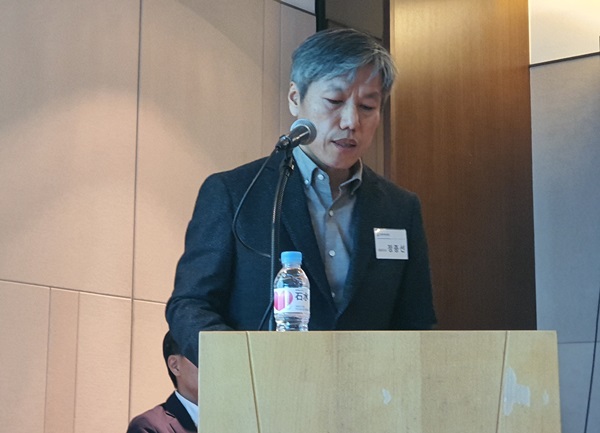Syntekabio said that it aims to become the world's first publicly-traded company specializing in artificial intelligence (AI)-based drug discovery.

“We will play a pivotal role in identifying the causes and cures of various diseases and develop new therapies based on precision medicine through the development of our big data and AI deep learning drug development platforms,” Syntekabio CEO Jung Joong-su said, during a press conference held ahead of the company’s initial public offering (IPO).
Syntekabio specializes in developing new AI drugs based on genome big data. Since its establishment in 2009, the company had focused on technology development and infrastructure construction until 2015.
After 2015, the company tried to commercialize products and attract investment based on its technology and signed co-research agreements with CJ Healthcare and JW Pharmaceutical in 2016. This year the company plans to finalize its co-research deal with LegoChem Bio.
More recently, Syntekabio has established its first pipeline after succeeding in identifying a new immunotherapy candidate through a joint study with CJ Healthcare and licensing in the technology in March of this year.
'Continuous clinical failures in biopharmaceutical industry an opportunity for Syntekabio'
During the news conference, Park Sung-hoon, the company’s CFO, remarked that the current crisis of the local biopharmaceutical industry is an opportunity for the company.
"In recent years, local biopharmaceutical companies have experienced negative results in clinical trials, which, in turn, has hurt the local biopharmaceutical sector as a whole,” Park said. “However, Syntekabio has the technology to look for biomarkers in patients who are expected to have high response rates to candidate drugs, and such a platform will improve clinical success and significantly reduce failures.”
Therefore, the recent crisis in the biopharmaceutical market could be a business opportunity for Syntekabio, Park added.
Park explained that this is because the company can increase the clinical success rate of anticancer drugs from the conventional 8 percent to more than three times during the full cycle of drug development -- phase 1 clinical trial to approval -- through its biomarkers detection platform.
Syntekabio's business model is primarily divided into AI drug development and precision medicine. AI drug development is a method of finding candidate substances through its discovery process and applying its unique technology during the development process.
In the discovery area, the company’s deep matcher platform, which discovers new synthetic compound drugs, predicts candidates with control target function by virtually combining numerous compounds saved in the company’s compound library for a given target protein, according to company officials.
The technology allows the company to screen a wide range of compounds quickly using AI, which, in turn, reduces the time and cost of finding candidates and minimize the potential for toxicity and adverse effects from off-targets.
The deep matcher platform can also discover drug-resistant biomarkers from the discovery stage using genome big data.
The recent candidate discovered with CJ Healthcare is also the result of the deep matcher platform. The company succeeded in extracting a leading substance in a mere six months using the platform for a candidate substance that failed to find meaningful indications for two years while using traditional methods.
STB001, a dual inhibitor of indoleamine 2,3-dioxygenase (IDO) and tryptophan 2,3-dioxygenase (TDO), showed a superior anticancer effect compared to Insight's epacadostat combination therapy by reducing the size of cancer by 72 percent in a rat experiment.
The company aims to license out the technology after completing the preclinical trials.
Syntekabio also introduced NEOscan, a platform that helps predict the development of bio-new drugs, especially neoantigens, for the development of customized immunotherapies, during the conference.
The company believes that the technology is hard to establish as it combines proven genome analysis accuracy, high-performance AI prediction algorithms, and Asian genome data, including Koreans.
“Notably, as experiments cannot substitute this field, the contribution made by the technology is great,” Director Yang Hyun-jin said.
In the development phase, the company uses the GBL scan, which discovers anticancer drug biomarkers based on 260,000 data points and PT scan, which identifies neurological disease biomarkers using genome big data and deep learning.
In the field of precision medicine, the company uses a next-generation sequencing-related genome precision medical service NGS-ARS, which provides genetic diagnosis and customized chemotherapy services.
AI drug development and licensing out is the company’s primary business model
The company’s primary revenue model is joint research with partners based on AI. In such cases, sales are generated in the form of a down payment from a partner with additional royalties after licensing out the technology.
Regarding in-house drug development, the company plans to focus on licensing out its existing STB001 technology.
While the company has been mainly cooperating with local companies, they plan to expand their market globally, starting from this year.
“This year, we are discussing collaboration with overseas partners at global events such as JP Morgan Healthcare Conference,” Yang said. “The company owns the only genome-specific supercomputing technology in Korea and expects to be competitive globally with its wide range of genome data.”

